
The Russian Academy of Sciences consists of the national academy of Russia; a network of scientific research institutes from across the Russian Federation; and additional scientific and social units such as libraries, publishing units, and hospitals.

The Ioffe Physical-Technical Institute of the Russian Academy of Sciences is one of Russia's largest research centers specialized in physics and technology. The institute was established in 1918 in Petrograd and run for several decades by Abram Ioffe. The institute is a member of the Russian Academy of Sciences.

Science and technology in the Soviet Union served as an important part of national politics, practices, and identity. From the time of Lenin until the dissolution of the USSR in the early 1990s, both science and technology were intimately linked to the ideology and practical functioning of the Soviet state, and were pursued along paths both similar and distinct from models in other countries. Many great scientists who worked in Imperial Russia, such as Konstantin Tsiolkovsky, continued work in the USSR and gave birth to Soviet science.

Georgy Sergeyevich Golitsyn is a prominent Russian scientist in the field of Atmospheric Physics, full member of the Academy of Sciences of the USSR since 1987, Editor-in-Chief of Izvestiya, Atmospheric and Oceanic Physics, ISSN 0001-4338, member of the Academia Europaea since 2000. 1990-2009 - Director of the A.M. Obukhov Institute of Atmospheric Physics, RAS, Moscow, Russia. He is a member of the princely house of Golitsyn. His father is the Russian writer Sergei Mikhailovich Golitsyn.
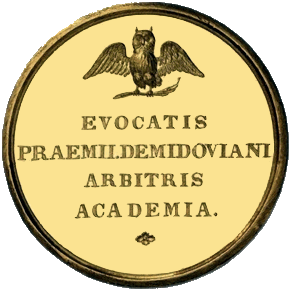
The Demidov Prize is a national scientific prize in Russia awarded annually to the members of the Russian Academy of Sciences. Originally awarded from 1832 to 1866 in the Russian Empire, it was revived by the government of Russia's Sverdlovsk Oblast in 1993. In its original incarnation it was one of the first annual scientific awards, and its traditions influenced other awards of this kind including the Nobel Prize.

Yury Sergeyevich Osipov is a Soviet and Russian mathematician. He was elected a full member of the Academy of Sciences of the USSR in 1987 and was a president of its successor, the Russian Academy of Sciences from 17 December 1991 to 29 May 2013.
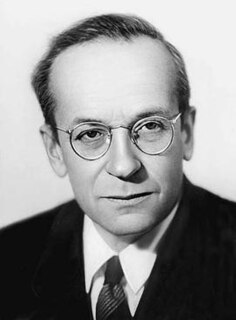
Vladimir Iosifovich Veksler was a prominent Soviet experimental physicist.

Gury Ivanovich Marchuk was a prominent Soviet and Russian scientist in the fields of computational mathematics, and physics of atmosphere. Academician ; the President of the USSR Academy of Sciences in 1986–1991. Among his notable prizes are the USSR State Prize (1979), Demidov Prize (2004), Lomonosov Gold Medal (2004).
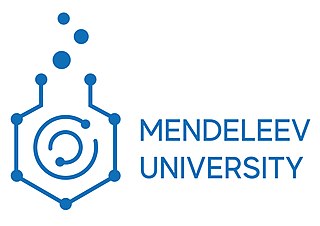
D. Mendeleev University of Chemical Technology of Russia (MUCTR) — is a federal state budgetary higher educational institution in Moscow, and is the largest Russian center for education and research in the field of chemical technology. The history of MUCTR can be traced back to the Moscow Industrial School initially founded in 1898. The university acquired its current name and status in 1992 with its Moscow campus mainly located on Miusskaya Square and in Tushino. The university's other two branches are situated in Novomoskovsk and Tashkent (Uzbekistan).
The prizes and gold medals named after prominent scientists are issued by the Russian Academy of Sciences for important scientific works, discoveries and inventions. The awards are issued in the name of the RAS according to the results of contests announced by the RAS Presidium.
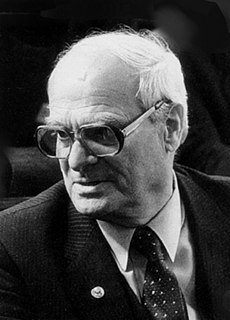
Mikhail Mikhaylovich Shultz, was a Soviet/Russian physical chemist, artist. Proceedings of the thermodynamic theory, the thermodynamics of heterogeneous systems, the theory of glasses, chemistry and electrochemistry of glass, membrane electrochemistry, the theory of ion exchange and phase equilibria of multicomponent systems, the theory of glass electrode. The name of the scientist linked the formation of pH-meters and ionometry, production organisation, instrumentation and materials commonly used in medicine, chemical and nuclear industry, aviation rocket and space technology, agriculture and many other areas.

Vadim Alekseyevich Kuzmin was a Russian theoretical physicist.

Hasan Abdullayev was a leading Soviet and Azerbaijani physicist, scientist and public official, who served as President of the National Academy of Sciences of the Azerbaijan SSR. He was a Doctor of Sciences in physics and mathematics, Professor of physics and mathematics, Director of the Institute of Mathematics and Physics of the National Academy of Sciences of the Azerbaijan SSR, full Academician of the National Academy of Sciences of the Azerbaijan SSR, corresponding member of the Soviet Academy of Sciences and Russian Academy of Sciences, and in 1970-1983 was the longest-serving President of the National Academy of Sciences of the Azerbaijan SSR. He was also an elected member of the Azerbaijan SSR Parliament, and the elected member of the 8th, 9th and 10th convocations of the Supreme Soviet of the Soviet Union. Academician Abdullayev was one of the founders of the Soviet semiconductors physics and a leading scientist in new technologies. He made an outstanding contribution to the development of electronics, astrophysics, aeronautics, medicine, biophysics and defense industries. Academician Abdullayev was the author of 585 Soviet and foreign patents, including 171 secret and 65 top secret patents, author of 28 scientific books (monographs), over 800 journal and encyclopedia articles in English, Russian and Azerbaijani languages.
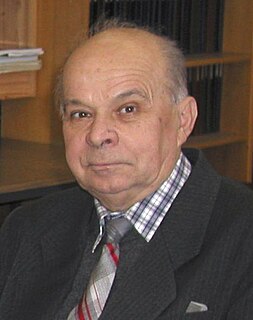
Aleksandr Dmitriyevich Garnovskii was a Russian chemist. Doctor of Chemical Sciences, Professor.

Viktor Aleksandrovich Kogan was a Russian chemist. Professor, Doctor of Chemical Sciences.
The Bruno Pontecorvo Prize is an award for elementary particle physics, established in 1995 by the JINR in Dubna to commemorate Bruno Pontecorvo. The prize is mainly given for neutrino physics, which was Pontecorvo's principal research field, and usually to a single scientist. It is offered internationally every year.

Valery Anatolyevich Rubakov is a Russian theoretical physicist. His scientific interests include quantum field theory, elementary particle physics, and cosmology. He is affiliated with the Institute for Nuclear Research (INR) of the Russian Academy of Sciences in Moscow.

Vladimir Ivanovich Picheta was a Russian and Soviet historian, first rector of the Belarusian State University, academician of the Academy of Sciences of the BSSR since 1928, Honorary Professor of the BSSR (1926), Corresponding Member of the USSR Academy of Sciences and Arts since 1939, Academician of the USSR Academy of Sciences since 1946.















